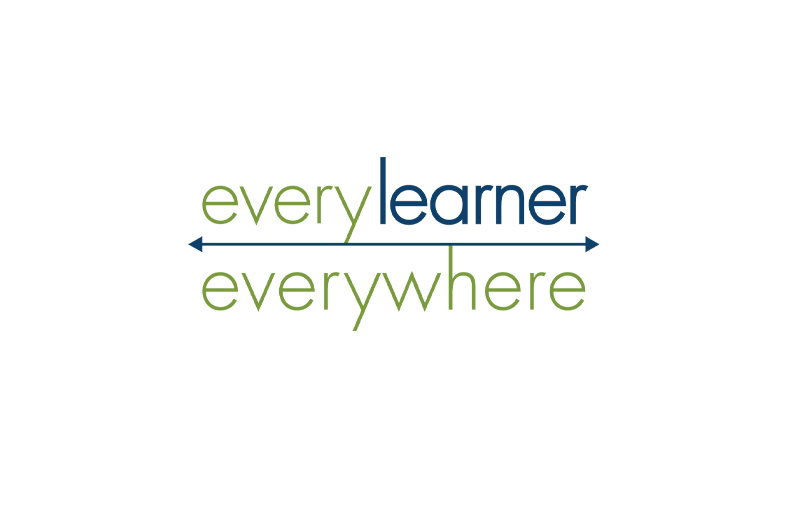
New Analysis Examines the Impact of Digital Learning on Minoritized and Poverty-Affected College Students
Literature Review on the Effect of Digital Learning on Two Impactful Practices: Pedagogy and Technology.

Literature Review on the Effect of Digital Learning on Two Impactful Practices: Pedagogy and Technology.
Boulder, CO (Apr 18, 2023) – The higher education system shows persistent gaps in student outcomes across multiple measures for historically minoritized students and students from low-income backgrounds. A new literature review, The Impact of Digital Learning on Minoritized and Poverty-Affected College Students, developed by Every Learner Everywhere, assesses the effectiveness of digital learning in decreasing equity gaps as well as the impact digital learning has on specific student populations: those who identify as Black, Latino, and Indigenous; students from low-income backgrounds; and first-generation students. Every Learner advocates for equitable outcomes in U.S. higher education through advances in digital learning, and this study examines digital learning including a broad range of curricular models, content and communication tools, design strategies, and instruction that personalizes learning for students in both blended and online learning environments.
Focused specifically on designed curriculum and pedagogy and the use of technology for online and blended classes, this study sought to answer the question, does digital learning support racially minoritized and poverty-affected populations enough to create a level playing field for college students of all races, ethnicities, and socioeconomic backgrounds? The study includes data collection on primary metrics used to measure student achievement in common higher-education key performance indicators (KPIs): pass rates, retention rates, progression rates, graduation rates, and student survey data. Of particular note, the Every Learner Student Interns added a great deal of clarity and value of perspective to the study results.
“This study grew out of our curiosity and desire to learn more about how technology impacts the students we are trying to serve: Black, Latino, Indigenous, and poverty-affected students. We all know the use of digital technology in higher education has great potential to improve educational outcomes for historically minoritized and poverty-affected students. And we wanted to find proof of whether that is the case,” says author, Laura DaVinci, Every Learner Everywhere Interim Director. “It turns out that the research is lacking any meta-analysis or high-volume peer-reviewed research. Anecdotal information is just not enough to make a difference at scale. There are great examples across the country of positive equitable impact when the technology is paired with high-quality implementation and teaching adopts evidence-based teaching practices, like active learning. Students reported equitable higher success and retention rates, a larger proportion of top grades, increased positive attitudes and flexibility, confidence, and non-judgmental feelings. Many models showed how faculty engagement and professional development was crucial to student success. We know from working with partner institutions that faculty are tracking the impact of digital learning on their students, but more often than not, the student data is not disaggregated by race and the results are not published.”
Our research exposed a serious paucity of studies exploring the impact of digital learning on Black, Latino, Indigenous, poverty-affected, and first-generation students. Studies are scarce, and when they exist, they are limited. More research would be beneficial, especially as digital learning has become integral to all higher education instruction. Each student has distinct needs: individualized instruction through digital tools can improve their academic achievements. Much of their success is dependent on equitable, evidence-based teaching practices.
To download the free resource, The Impact of Digital Learning on Minoritized and Poverty-Affected College Students, or learn more about Every Learner Everywhere and it’s collaborative approach to equitize higher education through digital learning, visit everylearnereverywhere.org. To contact Every Learner Everywhere, email everylearner@wiche.edu, or call (303) 541-0208. Follow Every Learner on Twitter @EveryLearnerNet.
Every Learner Everywhere is a network of partner organizations with expertise in evaluating, implementing, scaling, and measuring the efficacy of education technologies, curriculum and course design strategies, teaching practices, and support services that personalize instruction for students in blended and online learning environments. Our mission is to help institutions use new technology to innovate teaching and learning, with the ultimate goal of improving learning outcomes for Black, Latino, and Indigenous students, poverty-affected students, and first-generation students. Our collaborative work aims to advance equity in higher education centered on the transformation of postsecondary teaching and learning. We build capacity in colleges and universities to improve student outcomes with digital learning through direct technical assistance, timely resources and toolkits, and ongoing analysis of institutional practices and market trends. WCET (the WICHE Cooperative for Educational Technologies) and WICHE (the Western Interstate Commission for Higher Education) serve as the intermediary organization for the Every Learner Everywhere Network. For more information about Every Learner Everywhere and its collaborative approach to equitize higher education through digital learning, visit everylearnereverywhere.org.
This is a sponsored message and does not necessarily represent the views of the Education Writers Association, its board of directors, or its members. Want to see your release on the EWA site? Promote it with EWA.
Your post will be on the website shortly.
We will get back to you shortly